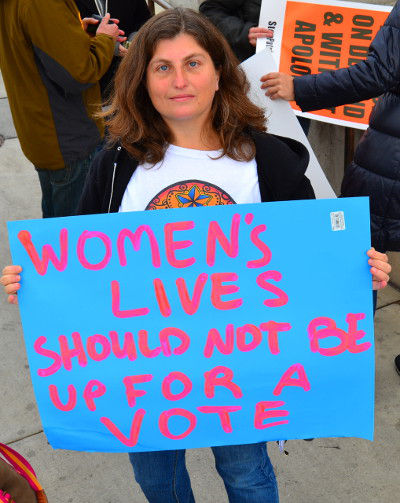From Stop Patriarchy
In Honor of Throw-Back Thursday
August 28, 2014 | Revolution Newspaper | revcom.us
Here is a piece I wrote last November. Read and consider what has happened since this was written eight months ago. We cannot sit back and wait for the courts to protect women. Last night at the second People's Hearing in Austin, Texas, Sunsara Taylor reminded us that we cannot look to politicians or the courts to save us; we might demand to be heard, we must demand the rights we deserve.
November 2013. I recently heard Sunsara Taylor speak to a student group at a nearby college. She spoke about the need to stand up against the intensifying war against women in this country. In particular, she spoke about the efforts of her organization, StopPatriarchy.org, to fight the attacks on abortion clinics and to challenge the outrageous laws being passed that limit women’s right to abortion. In recent months Taylor has traveled over 12,000 miles with other members of the Abortion Rights Freedom Ride to carry this message across the country. More recently members of Stop Patriarchy have been in Mississippi to support the Jackson Women’s Health Clinic, and are now in Albuquerque, NM to stand against a ballot initiative banning abortion at 20 weeks. She stressed that we must work together, not just locally but across the country, in order to bring real and necessary change.

Albuquerque, November 2013
During the question-answer period someone challenged Taylor’s approach to these issues. Rather than take to the streets or build networks of support across the country, why not just trust the courts? He pointed to recent advances in the area of gay marriage; ten years ago nobody would expect gay marriage to be legal and protected by the courts. The courts, he said, generally get it right if you wait long enough: Brown v Board of Education, The Civil Rights Act, and even Roe v Wade. We will see the courts again, he argued, come down on the side of women’s rights, even if it isn’t perfectly clear right now.
Taylor agreed that those were important court cases but she suggested that he had the order backwards. The wisdom of Supreme Court judges did not initiate in each new era of protections; the cries and demands of the people pressured the Supreme Court to address each issue. Before discriminating laws against African-Americans were overturned by the courts, there were boycotts, sit-ins, and marches to raise awareness and unify Americans against the assault on basic rights. In the 1960s Freedom Riders challenged racist laws by organizing groups of blacks and whites to ride interstate buses across the south. Activists were threatened, attacked, and some even murdered. The feminist movements of the 1960s and 1970s argued for access to better jobs and equal pay for women, they fought against discrimination and for the right of women to control their own bodies. The newly formed National Organization for Women (NOW) lobbied Congress for pro-equality laws and raised their voices in unison against the continued treatment of women as second-class citizens. Taylor made the point very clearly: first comes the outrage by the people, and then comes the attention of the courts.
In the summer of 2013 Abortion Rights Freedom Riders traveled through 27 states to build networks of support in this continuing war against women. In Jackson activists chanted loud and clear “Not the courts, not the state, women must control their fate” as they stood together in support of the last abortion clinic in Mississippi. Right now in Albuquerque pro-women’s groups have taken to the street to fight the Nov. 19 ballot initiative banning abortion after 20 weeks. We email, tweet, post on Facebook, talk on the phone, contribute to the cause, and raise our voices in unison.
We cannot wait for the courts to “get it right.” Only the cries and demands of the people will lead to real and necessary change.
Volunteers Needed... for revcom.us and Revolution
If you like this article, subscribe, donate to and sustain Revolution newspaper.
